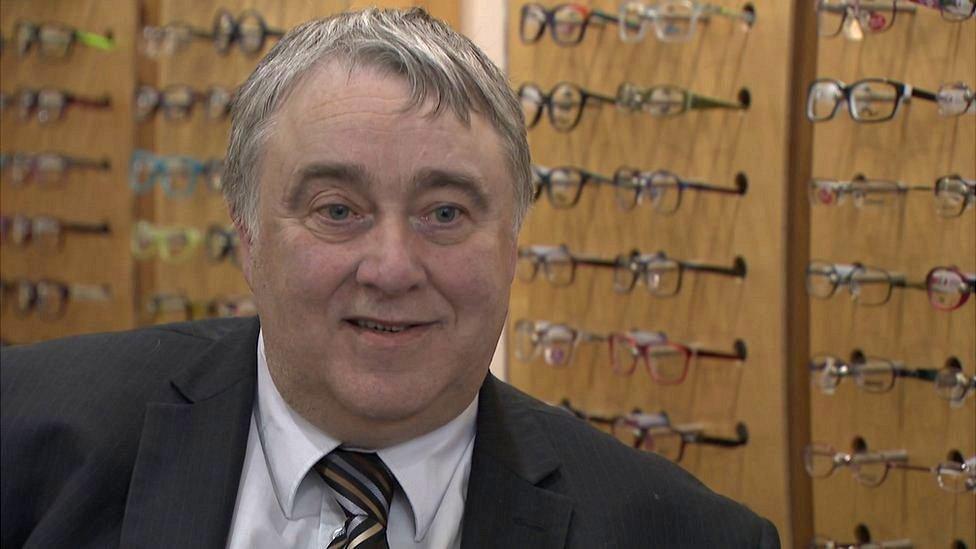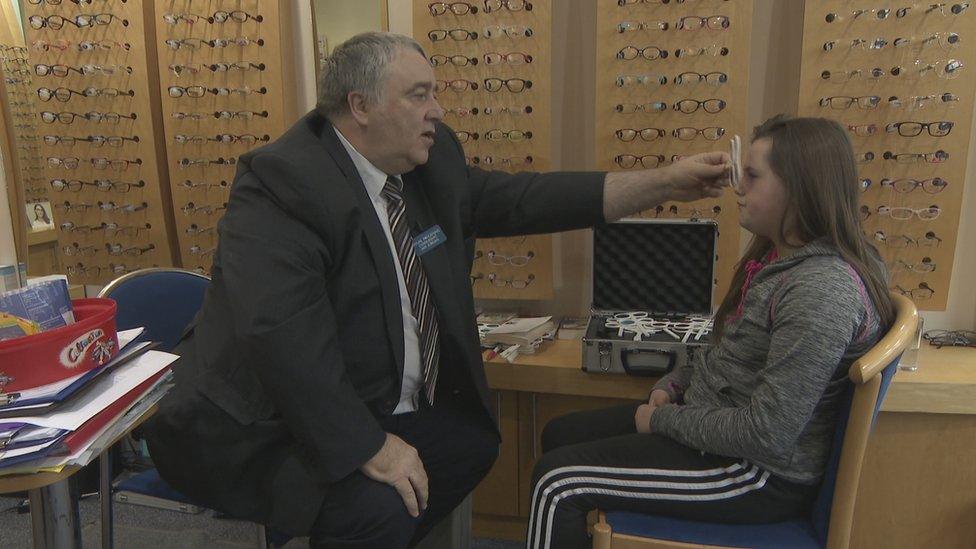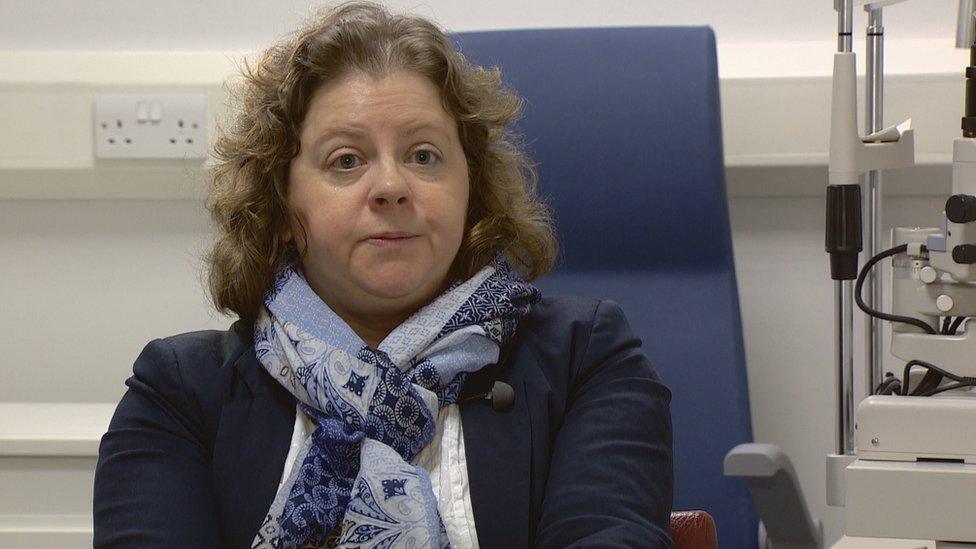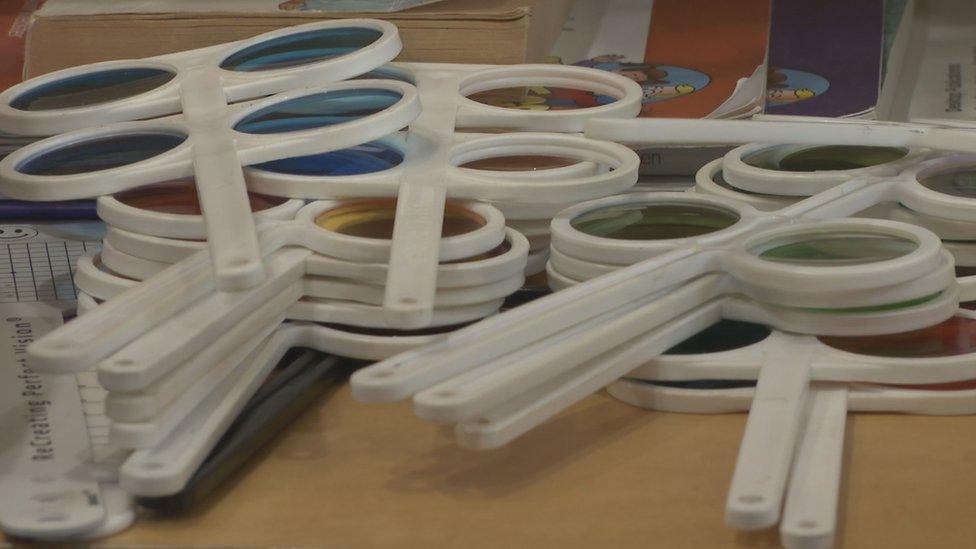Optician who claims to treat autism struck off
- Published
Optician struck off over tinted lenses 'cures'
An optician who claims to be able to treat the vision of people with autism and brain injuries using coloured filters has been struck off.
Ian Jordan works in Ayr but has seen thousands of patients from across the UK and abroad.
He claims he has been able to transform the lives of patients with a range of visual problems by using tinted lenses.
But the General Optical Council has now "erased" him from its register of dispensing opticians.
'Unwarranted confidence'
Experts say there is evidence that tinted lenses can help treat specific problems including migraines and reading difficulties.
But that those who claim the lenses can do more are bringing the profession into disrepute.
It said he had shown "disregard for his professional colleagues" and had an "inflated and unwarranted confidence in his own professional abilities".
The determination said he had "disregard for the scope of his practice and the potential risks to patients".
It said there had been "repeated and persistent departures from professional standards" and that despite his best intentions "there had been potential for harm to patients as a result of deliberate conduct".
It added that there had been "a series of abuses of patients' trust and their rights to be informed and involved in their treatments".
There are about 30,000 registered opticians in the UK and last year seven were struck off.

Ian Jordan has been struck off by the General Optical Council
Before his GOC hearing, Mr Jordan told BBC Scotland he felt he had to try to help patients whose visual problems were not corrected by traditional refractive lenses.
He said he would continue his work as a visual processing consultant - which he can do despite being struck off.
Mr Jordan said there were many people whose vision could not be treated with strong lenses but who could be helped by filters.
He said: "The differences in people are life-changing. We see people on a daily basis with all sorts of major problems."
Mr Jordan claimed many people on the autistic spectrum had some form of prosopagnosia or face-blindness, a cognitive disorder of face perception rather than a problem with their eyes.
He claimed optical professionals were usually unaware of the importance of tints but the effect was well known in the autism community.
He said: "In some cases in autism, for instance, if you can't see your parent's face but you don't have a refractive error that is significant - that means you don't have a strong enough lens - you are told you can't use the health service."

Ian Jordan claims thousands of patients have benefited from his methods
Mr Jordan said he had seen between 6,000 and 7,000 patients and he believed that about 5,500 had seen a significant difference.
But he admitted there was not much official research into this area and more needed to be done to prove the effectiveness of the treatments.
He said: "I think it is absolutely essential that people with these sorts of problems are addressed. It is a crying shame it has been ignored for so long."
Mr Jordan said: "Sadly, the methods which are commonly used in optics often do not address the problems in special needs.
"We have experience and deal with these problems on a daily basis and have won awards in this context - probably the only practice in the UK to be so honoured.
"At all times I worked in the best interests of the patients. I am happy with my position."
False hope
However, academics warned such practices could provide false hope to patients and damage the profession.
Dr Nadia Northway, a lecturer at Glasgow Caledonian University, told the BBC: "The problem of having a number of people who do not practice in ways that are recommended is that it brings disrepute to the whole field.
"Good and legitimate practitioners find themselves defending what they are doing a lot of the time.

Dr Nadia Northway says it is important professional follow guidelines
"In the long term it is quite damaging when people take it upon themselves to say they are going to do more than they can actually prove that they can do."
Dr Northway said having success with some specific patients did not mean it would be something that could be applied to a large body of people or provided on the NHS in general.
She said the NHS in Scotland was "actually quite far ahead in terms of providing coloured lenses and the evaluation of the effects of colour".
However, she added: "We don't want to give patients false hope that we can manage conditions that there is currently no answer for."
She said: "I don't understand why you would think a pair of glasses could cure a condition which is genetically based or based around a disease process which has damaged parts of the brain.
"I would never condone anyone using the cure word. I tell my patients that if anyone uses the cure word then they should immediately walk out the door."

How does colour help vision?

The filters are not refractive lenses like those used in spectacles
Dr Northway said it was quite common for people to get "unpleasant visual distortions" with stripes or flickering.
However, she said some people were more susceptible to these stripe effects and would see visual illusions that gave them fatigue and headaches.
She said the coloured lenses filtered out light.
"The current theory is that colour calms down the amount of stimulus going to these visually sensitive cells," she said.
"We think at the moment there are hyperexcitable cells and by using colour you divert the neural activity in your brain away from them or you calm them down by reducing the amount of activity."